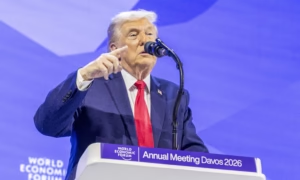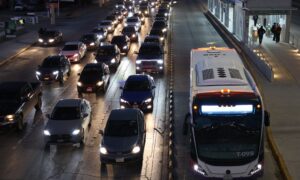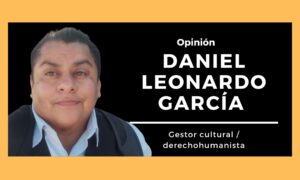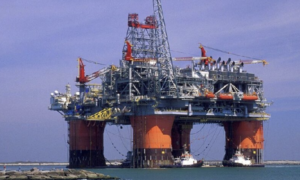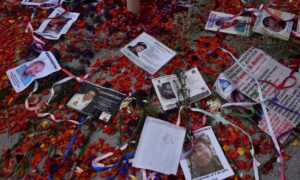Within a hostile context for citizens and the planet, X Latin American media sources reflect on the global and regional implications of Donald Trump’s return to the U.S. presidency. His withdrawal from the Paris Agreement, his anti-immigrant policy and his climate change denial have a wide-reaching impact that seriously affects the future of the planet. We are committed to journalism that transcends catastrophizing and is anchored in the complexity of reality. Our goal is to denounce abuses of power, to give visibility to resilience and to a the most sectors. In the current situation, which is characterized by polarization, misinformation and information overwhelm, we want to reaffirm our mission to investigate, explain and connect the critical dots to contribute to a deeper and more nuanced understanding of these challenging times.
By La Verdad Juárez
It has been hard to keep up with President Donald Trump since his return to the White House on January 20. In record time, he has signed so many executive orders and proclaimed so many grandiose plans and threats that journalists and commentators have described the beginning of his presidential term as a blitz, a bombing, an earthquake, a storm, or an avalanche.
The chaos kicked up is not the result of improvisation. Quite the opposite. Trump’s former strategist Steve Bannon warned of this in 2019 with another metaphor that also alluded to catastrophe, saying all they had to do was “flood the zone” at full speed. Journalists and the media (considered opponents by Trump and Bannon) would therefore be so overwhelmed that they would not be able to react in time. Without timely and quality information, citizens and the other branches of government would be disarmed.
The plan has only half worked. Journalists have been working tirelessly, and of this flood of executive orders, several have already been sued for their dubious legality. But, while the matter is being settled in U.S. courts —and whether or not the government complies with the judges’ orders— Trump’s decisions have already affected millions of people around the world: thousands of migrants have been deported, the U.S. Agency for International Development (USAID) is being dismantled, international commitments have been broken, and trade wars have begun with a selective imposition of tariffs.
The decisions of the last few days affect not only the present, but also the future of the planet and its inhabitants. One of the first orders Trump signed was the withdrawal from the Paris Agreement. This decision comes just as the global temperature has already surpassed the threshold of an additional 1.5 degrees, the limit established in the agreement. The data and the science, however, do not seem to concern the president of the world’s most polluting country nor the oil lobbyists he has appointed to the Environmental Protection Agency (EPA), who deny that burning fossil fuels has any effect on the climate crisis.
As for Latin America and the Caribbean, one of the regions most vulnerable to the climate emergency, the president made his position clear on his second day in office: “They need us much more than we need them. We don’t need them.” The slogan ‘America First’ has replaced concepts such as shared responsibility and multilateralism. The change in terminology, tone and attitude in the White House and State Department reflects the idea that countries will do what Trump wants, by hook or by crook.
This has been made clear by the treatment of migrants —the vast majority of whom are of Latin American origin— and the ineffectiveness of diplomatic protests by a few countries against Washington’s new anti-immigrant policy. After capturing more than 14,000 people in raids, most have been deported to Mexico, Guatemala, Colombia, Brazil, Peru, Ecuador and Venezuela, after negotiating a pragmatic agreement with Nicolás Maduro. The number of deportees to this country is expected to increase in the coming months, as Trump canceled Temporary Protected Status (TPS) for more than 300,000 Venezuelans who believed they were safe. These measures violate the rights of these people to asylum and protection, due process, and non-separation from families, among others.
Latin American countries will have to respond to this situation using their own resources, as they will no longer be able to count on the humanitarian aid previously financed by the U.S. government, which also earmarked millions of dollars for other causes, including the protection of the Amazonian territory shared by Brazil, Colombia, Ecuador, Guyana, Peru and Suriname. This is no minor matter: the Amazon is a strategic place for climate regulation and biological balance due to its flying rivers, its storage of 20% of global carbon, and its status as home to 10% of all known species, along with 308 indigenous peoples who speak more than 200 languages.
This ecosystem is already under pressure from deforestation caused by illegal gold mining and drug trafficking, which encourages land invasion and logging to plant coca. While Trump has promised to be tough on drug trafficking and organized crime, judging by some of his speeches and pronouncements in these first weeks, he expects countries in the region to take charge and demonstrate results, without necessarily receiving the same amount of economic support that Washington has given them in the past.
Although it is not yet clear what proportion of resources the US will end up providing or cutting for the region, Washington’s new foreign policy and the response of Moscow and Beijing in this new geopolitical order will be an important factor in the upcoming presidential elections in Ecuador (the second round will be held in April), Bolivia, Chile, Honduras and Haiti (if the domestic situation allows this year), and Colombia, Peru, Brazil and Costa Rica in 2026.
Whatever happens in the coming years, the journalists of this network of independent media sources in Latin America are compelled to try to explain how the decisions of one man, or two —for we cannot ignore Elon Musk— from the Oval Office can have a transversal effect not only on regional politics, but also on the continent’s most vulnerable communities. To do this, we need to strengthen our collaborative networks, both transnational and hyper-local. We also cannot lose sight of what is happening in hard-to-reach places such as the Amazon, or of issues potentially overlooked by other media and therefore underrepresented in the public discussion.
These are challenging and demanding times for this profession, for different reasons: systematic attacks from those in power and organized crime, polarization and disinformation, which often also seek to undermine the credibility of the media and journalists, and the information fatigue of audiences and readers, who are overwhelmed by the accumulation of bad news.
We have set out to encourage journalism that avoids reactivity and catastrophizing, that does not allow itself to be overwhelmed by the flood of information noise and lies on social media, but that anchors itself with a genuine commitment to reality, which will always be more complex and nuanced. This is why we must also strive to document the resilience, adaptation and resistance of society, institutions and leadership, while constantly investigating abuses of power and corruption through a rigorous practice of the profession.
In the midst of the flood and chaos brought on by Trump, we have no choice but to continue to collaborate and spread our roots through the mud. After all, the Victoria amazonica, the largest water lily in the world and the emblem of our Amazon region, blooms in the mud at dusk.
Media sources that are jointly publishing this editorial:
- OjoPúblico (Peru)
- SUMAÚMA (Brasil)
- El Espectador (Colômbia)
- Casa Macondo (Colômbia)
- PopLab (México)
- Lado B (México)
- Raichalí (México)
- Istmo Press (México)
- Perimetral (México)
- La Liga Contra el Silencio (Colômbia)
- Revista Nómada (Bolívia)
- Código Vidrio (Equador)
- Plan V (Equador)
- Agenda Propia (Colombia)
- Cuestión Pública (Colombia)
- GK (Ecuador)
- Periodistas por el Planeta (Argentina)
- La Verdad de Juárez (México)
- InfoAmazonia (Brasil).







